|
|
|
Sort Order |
|
|
|
Items / Page
|
|
|
|
|
|
|
| Srl | Item |
| 1 |
ID:
129469
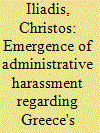

|
|
|
|
|
| Publication |
2013.
|
| Summary/Abstract |
This article is based on official, recently declassified documents to provide an analysis of the emergence of policies of discrimination applied against the Turks of Greek Thrace. It does this by unveiling the efforts of the local authorities to construct a coherent political project that would block the expansion of Turkish nationalism among minority Muslims. After certain historical events, this project became even more exclusionary. Crucial in this direction was the establishment of a secret, official council, its operation described here. The projects it formulated and put forward were decisive for the establishment of a regime of practices of administrative harassment, applied in Greek Thrace until the early 1990s but never officially recognized
|
|
|
|
|
|
|
|
|
|
|
|
|
|
|
|
| 2 |
ID:
080703
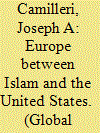

|
|
|
|
|
| Publication |
2008.
|
| Summary/Abstract |
Europe and its leaders, though they may not fully comprehend the significance of the events that are rapidly unfolding, and whether they like it or not, are key players in the historical process that will shape the geopolitics of the Middle East and Islam's response to the challenge of modernity. This is not say that Europe has it in its power to determine the choices that Iran and the Arab world will make, nor indeed should it attempt to do so. On the other hand, it does have a margin of manoeuvre which, depending on the way it is exercised, may tilt the balance in favour either of the politics of coexistence and cooperation or the politics of confrontation. European choices and capacities will revolve around four questions: How will European policies and attitudes position themselves vis- -vis the Orientalist tendencies of the past? What steps might be taken to clear the backlog of unresolved geopolitical tensions and misunderstandings? Can Europe develop a programmatic approach to regional and international governance which accepts cultural plurality as its foundation stone, even if this should create tensions in the transatlantic relationship? Is Europe disposed to forge a new social compact that accepts Muslims in Europe as European citizens fully engaged in the task of European construction? The article argues that these are not four unrelated questions, each with its own separate logic and modus operandi, but four mutually constitutive policydilemmas that will in large measure reflect and in part shape European efforts to fashion a new identityand sense of place in the world
|
|
|
|
|
|
|
|
|
|
|
|
|
|
|
|
| 3 |
ID:
179298


|
|
|
|
|
| Summary/Abstract |
In Togo, the opposition movement behind the anti-government protests that broke out in 2017–2018 appears to reflect a greater role for Islam in politics. Tikpi Atchadam, leader of the Parti National Panafricain, was the preeminent figure in the movement, having built a solid grassroots base among his fellow Muslims. This article examines the unique role that Muslim leaders played in these protests, as well as the Faure Gnassingbé regime's strategic response. The ruling party made spurious claims against Muslim opponents, associating them with a dangerous wave of political Islam. I argue that by portraying Atchadam as the leader of a radical ethnic and religious movement with Islamist goals, Faure Gnassingbé and his supporters sought to weaken this emerging challenger and deter members of the public from backing calls for political change. The strategy also helped garner support from Western countries while simultaneously driving a wedge between Muslim community leaders.
|
|
|
|
|
|
|
|
|
|
|
|
|
|
|
|
| 4 |
ID:
184195
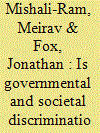

|
|
|
|
|
| Summary/Abstract |
This study asks whether governmental and societal discrimination against Muslim minorities explains the outflow of foreign fighters from non-Muslim-majority countries to Syria and Iraq. We use data from the ICSR, Soufan Group, Pokalova (2018), and RASM datasets to examine the connection between discrimination directed at Muslim minorities and the number of foreign fighters originating in a country. We apply grievance-based theory to examine whether minority-specific objective discrimination is behind the phenomenon. We find little evidence that discrimination increases the outflow of foreign fighters, but this outflow is higher from wealthier countries. The findings indicate that if grievances are a motivation for individuals to become foreign fighters, they are not connected to objective discrimination. This implies that at least some of the grievances relate to personal circumstances or that immigrant minorities are more likely to perceive inequality in wealthier countries.
|
|
|
|
|
|
|
|
|
|
|
|
|
|
|
|
| 5 |
ID:
052643


|
|
|
| 6 |
ID:
113891
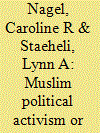

|
|
|
|
|
| Publication |
2011.
|
| Summary/Abstract |
Scholarship on Muslim political mobilisation in the West has developed as an important counterpoint to public discourse, which has tended to cast Muslims as a threat to social cohesion, liberal democracy, and national security. But even as scholarly literature has shed light on civic participation among Muslims, it has sidelined the diversity of political identities and values that motivate them. Most, if not all, Muslims in the West find their identities politicised in some way, but the question of whether this leads to a consensus amongst Muslims about the role of religion in public life often remains unexamined. In this article we draw on interviews with seventy-eight activists in Britain and the United States who are both Muslim and Arab to complicate ideas about the political mobilisation of Muslims in the West. Respondents, we show, are far from unified in their views on religion as a basis for political action and mobilisation. Some are keen to place Islam squarely in mainstream political spaces; most, however, are insistent that Islam should remain a private faith and identity and that political mobilisation should take place under the aegis of Arabness or other 'secular' identities. Using theoretical perspectives on the public sphere, we explain the complexity of our respondents' political identities and activism. Our overall aim is to broaden perspectives on the ways in which people from Muslim backgrounds participate in public, political life in Western contexts.
|
|
|
|
|
|
|
|
|
|
|
|
|
|
|
|
| 7 |
ID:
080706


|
|
|
|
|
| Publication |
2008.
|
| Summary/Abstract |
Until the middle of the twentieth century, Muslims living in European countries were mainly indigenous people, completely assimilated with the rest of the population. Both their religion and their representative organizations enjoyed legal recognition, sometimes centuries long.
A significant influx of immigrants of Muslim origin to Europe began in the mid twentieth century and a need for legal regulations sanctioning the status of Muslims within largely Christian societies became apparent. Their situation in this respect differs from country to country, sometimes due to a lack of an organization that would represent all the Muslims in a particular country, sometimes because of legal technicalities. In some countries, it is not even possible for Muslim immigrants to become citizens.
The legal situation of Islam and its adherents exerts an important influence on their attitude towards their new country of residence and towards Europe, as well as significantly influencing their loyalty
|
|
|
|
|
|
|
|
|
|
|
|
|
|
|
|
| 8 |
ID:
169121
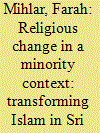

|
|
|
|
|
| Summary/Abstract |
Scholarly work exists on how Muslim minority positioning affects identity and politics, but what is less known is its impact on religion. Sri Lanka’s 9% Muslim population, the country’s second largest minority, has undergone a series of recent changes to religious identity, thinking and practice, which have been shaped by its relationship to the dominant and warring ‘ethnic others’. As Sri Lanka plunged deeper into armed conflict in the 1990s, Muslims experienced significant shifts in religious thinking and practice, identifying strictly with a more ‘authentic’ Islam. After the war ended in 2009, Muslims became the target of majoritarian Sinhala-Buddhist violence, resulting in a reinterpretation of Islam and a counter process of change. Using the Sri Lankan Muslim case study to engage with scholarly critiques of majority–minority binaries, this article analyses how religious change is brought about through the interjection of minority status with ethno-nationalisms and conflict. Its focus on Islam in Sri Lanka contributes to area studies and to Islamic studies, the latter through a rare analysis of Islamic reform in a Muslim minority context.
|
|
|
|
|
|
|
|
|
|
|
|
|
|
|
|
| 9 |
ID:
126017
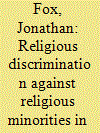

|
|
|
|
|
| Publication |
2013.
|
| Summary/Abstract |
This study examines religious discrimination between 1990 and 2008 against 47 religious minorities in 17 Middle Eastern Muslim majority states using data from the Religion and State-Minorities data-set. The study uses a 29-category variable which measures restrictions on the religious practices or institutions of minority religions which are not placed on the majority religion. Forty-five of the 47 minorities, including all non-Muslim minorities, experience religious discrimination. Discrimination is lowest but still substantial against Muslim minorities (e.g. Shi'i Muslims in a Sunni Muslim state), higher against Christians, but highest against Hindus, Buddhists, Druze, and Bahai. Twenty-eight of the 29 types of religious discrimination included in the data-set are present in the region. Finally, when discounting the removal of Saddam Hussein's regime from Iraq, religious discrimination in the region remains stable.
|
|
|
|
|
|
|
|
|
|
|
|
|
|
|
|
| 10 |
ID:
191623


|
|
|
|
|
| Summary/Abstract |
Quintan Wiktorowicz’s typology and other methods of classification developed by other scholars from his approach have been the most popular when studying Salafism. However, such typologies, especially when examining Salafism in non-Middle Eastern and minority contexts, have their shortcomings. The first main problem with current typologies is that they discuss distinct Salafi factions at a specific time and local context, but intend to be universal. However, these factions often tend not to be conceptually different, as in many cases, their participants only behave differently due to different circumstances in different localities. Second, these typologies were devised by scholars who chiefly study the Middle East and distinguish different Salafi groups based on their discourses on issues often relevant only in Middle Eastern contexts. This article tests the applicability of the existing classifications of Salafism by drawing on three ethnographic case studies from Cambodia. In Cambodia, Salafism emerged in a Muslim minority context. With the expansion of its networks, fragmentation occurred within the movement due to disagreements such as how to deal with the Muslim (non-Salafi) other and the non-Muslim majority. The article argues that classifications should be set up based on observing local group dynamics instead of being universal. This is because differences among Salafis, just as in other social movements, mainly arise due to the participants’ interaction with the local realities and issues.
|
|
|
|
|
|
|
|
|
|
|
|
|
|
|
|
|
|
|
|
|